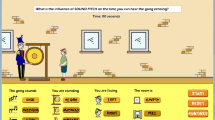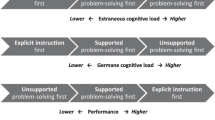Abstract
The use of investigations in science teaching is both common and commonly advocated for in science education literature. We suggest that the use of investigations should differ depending on the complexity of the subject matter. That complexity can vary depending on both the nature of the information and students’ expertise levels. The present study used Cognitive Load Theory and tested a hypothesis that the sequential order of having investigations first followed by explicit instruction only is more effective than that of having explicit instruction first when students have acquired sufficiently high levels of knowledge. This hypothesis was tested with 85 middle school students. Participants were randomly assigned to one of the two sequences. The results indicated that for sufficiently knowledgeable students, a dis-ordinal knowledge level by sequence interaction was obtained. There was an advantage to the explicit instruction first approach for the less knowledgeable students for whom element interactivity was high but an advantage to the investigation first approach for the more knowledgeable students for whom element interactivity was lower. The results were discussed in light of a recent debate between the authors and De Jong et al. (Educational Research Review, 39, 1-14, 2023) on the role of investigations and explicit instruction in science education.


Similar content being viewed by others
References
Ashman, G., Kalyuga, S., & Sweller, J. (2020). Problem-solving or explicit instruction: Which should go first when element interactivity is high? Educational Psychology Review, 32, 229–247. https://doi.org/10.1007/s10648-019-09500-5
Chen, O., Kalyuga, S., & Sweller, J. (2015). The worked example effect, the generation effect, and element interactivity. Journal of Educational Psychology, 107(3), 689–704.
Chen, O., Kalyuga, S., & Sweller, J. (2017). The expertise reversal effect is a variant of the more general element interactivity effect. Educational Psychology Review, 29, 393–405.
Chen, O., Paas, F., & Sweller, J. (2023). A cognitive load theory approach to defining and measuring task complexity through element interactivity. Educational Psychology Review, 35, 63. https://doi.org/10.1007/s10648-023-09782-w
De Jong, T., Lazonder, A. W., Chinn, C. A., Fischer, F., Gobert, J., Hmelo-Silver, C. E., Koedinger, K. R., Krajcik, J. S., Kyza, E. A., Linn, M. C., Pedaste, M., Scheiter, K., & Zacharia, Z. C. (2023). Let’s talk evidence – the case for combining inquiry-based and direct instruction. Educational Research Review, 39, 1–14.
DeCaro, M. S., & Rittle-Johnson, B. (2012). Exploring mathematics problems prepares children to learn from instruction. Journal of Experimental Child Psychology, 113(4), 552–568.
Fyfe, E. R., DeCaro, M. S., & Rittle-Johnson, B. (2014). An alternative time for telling: When conceptual instruction prior to problem solving improves mathematical knowledge. British Journal of Educational Psychology, 84(3), 502–519.
Glogger-Frey, I., Fleischer, C., Grüny, L., Kappich, J., & Renkl, A. (2015). Inventing a solution and studying a worked solution prepare differently for learning from direct instruction. Learning and Instruction, 39, 72–87.
Hsu, C.-Y., Kalyuga, S., & Sweller, J. (2015). When should guidance be presented during physics instruction? Archives of Scientific Psychology, 3(1), 37–53. https://doi.org/10.3886/ICPSR35626.v1
Jacobson, M. J., Markauskaite, L., Portolese, A., Kapur, M., Lai, P. K., & Roberts, G. (2017). Designs for learning about climate change as a complex system. Learning and Instruction, 52, 1–14.
Kalyuga, S. (2007). Expertise reversal effect and its implications for learner-tailored instruction. Educational Psychology Review, 19, 509–539.
Kalyuga, S., Ayres, P., Chandler, P., & Sweller, J. (2003). The expertise reversal effect. Educational Psychologist, 38, 23–31.
Kapur, M. (2008). Productive failure. Cognition and Instruction, 26, 379–424.
Kapur, M. (2010). Productive failure in mathematical problem solving. Instructional Science, 38, 523–550.
Kapur, M., & Bielaczyc, K. (2012). Designing for productive failure. Journal of the Learning Sciences, 21(1), 45–83.
Kirschner, P., Sweller, J., & Clark, R. (2006). Why minimal guidance during instruction does not work: An analysis of the failure of constructivist, discovery, problem-based, experiential and inquiry-based teaching. Educational Psychologist, 41, 75–86.
Loibl, K., & Rummel, N. (2014). The impact of guidance during problem-solving prior to instruction on students’ inventions and learning outcomes. Instructional Science, 42, 305–326.
Matlen, B. J., & Klahr, D. (2013). Sequential effects of high and low instructional guidance on children’s acquisition of experimentation skills: Is it all in the timing? Instructional Science, 41(3), 621–634.
NGSS Lead States. (2013). Next generation science standards: For states, by states. The National Academies Press.
Schwartz, D. L., & Martin, T. (2004). Inventing to prepare for future learning: The hidden efficiency of encouraging original student production in statistics instruction. Cognition and Instruction, 22(2), 129–184.
Schwichow, M., & Zoupidis, A. (2023). Teaching and learning floating and sinking: A meta-analysis. Journal of Research in Science Teaching, 1–30. https://doi.org/10.1002/tea.21909
Sweller, J. (2010). Element interactivity and intrinsic, extraneous, and germane cognitive load. Educational Psychology Review, 22, 123–138. https://doi.org/10.1007/s10648-010-9128-5
Sweller, J., Ayres, P., & Kalyuga, S. (2010). Cognitive load theory. Springer.
Sweller, J., van Merriënboer, J., & Paas, F. (2019). Cognitive architecture and instructional design: 20 Years Later. Educational Psychology Review, 31(2), 261–292.
Sweller, J., Zhang, L., Ashman, G., Cobern, W., & Kirschner, P. A. (2024). Response to De Jong et al.’s (2023) paper “Let's talk evidence – The case for combining inquiry-based and direct instruction”. Educational Research Review. https://doi.org/10.1016/j.edurev.2023.100584
van Gog, T., Kester, L., & Paas, F. (2011). Effects of worked examples, example-problem, and problem-example pairs on novices’ learning. Contemporary Educational Psychology, 36(3), 212–218.
Weaver, J. P., Chastain, R. J., DeCaro, D. A., & DeCaro, M. S. (2018). Reverse the routine: problem solving before instruction improves conceptual knowledge in undergraduate physics. Contemporary Educational Psychology, 52, 36–47.
Zhang, L., Kirschner, P. A., Cobern, W. W., & Sweller, J. (2022). There is an evidence crisis in science educational policy. Educational Psychology Review, 34(2), 1157–1176. https://doi.org/10.1007/s10648-021-09646-1
Author information
Authors and Affiliations
Contributions
JS: conceptualization, methodology, writing—reviewing and editing. LZ: intervention design, data collection, analysis, writing—original draft preparation.
Corresponding author
Ethics declarations
Ethics approval
Consents and assents were obtained following Institute Review Board requirements.
Additional information
Lin Zhang. Department of Elementary & Special Education, Providence College, 324 Harkins Hall, 1 Cunningham Square, Providence, RI, USA. E-mail: lzhang@providence.edu
John Sweller. School of Education, University of New South Wales, Sydney, Australia
Current themes of research and most relevant publications
Zhang, L., Kirschner, P. A., Cobern, W. W., & Sweller, J. (2022). There is an evidence crisis in science educational policy. Educational Psychology Review, 34(2), 1157-1176. doi:https://doi.org/10.1007/s10648-021-09646-1
Zhang, L. (2019). “Hands-on” plus “inquiry”? Effects of withholding answers coupled with physical manipulations on students’ learning of energy-related science concepts. Learning and Instruction, 60, 199-205. doi:10.1016/j.learninstruc.2018.01.001
Zhang, L., & Van Reet, J. (2022). How is “Knowledge” constructed during science activities? Detaching instructional effects of “Playing” and “Telling” to optimize integration of scientific investigations. Research in Science Education, 52, 1435-1449. doi:https://doi.org/10.1007/s11165-021-09990-w
Publisher’s note
Springer Nature remains neutral with regard to jurisdictional claims in published maps and institutional affiliations.
Rights and permissions
Springer Nature or its licensor (e.g. a society or other partner) holds exclusive rights to this article under a publishing agreement with the author(s) or other rightsholder(s); author self-archiving of the accepted manuscript version of this article is solely governed by the terms of such publishing agreement and applicable law.
About this article
Cite this article
Zhang, L., Sweller, J. Instructional sequences in science teaching: considering element interactivity when sequencing inquiry-based investigation activities and explicit instruction. Eur J Psychol Educ (2024). https://doi.org/10.1007/s10212-024-00799-5
Received:
Revised:
Accepted:
Published:
DOI: https://doi.org/10.1007/s10212-024-00799-5




